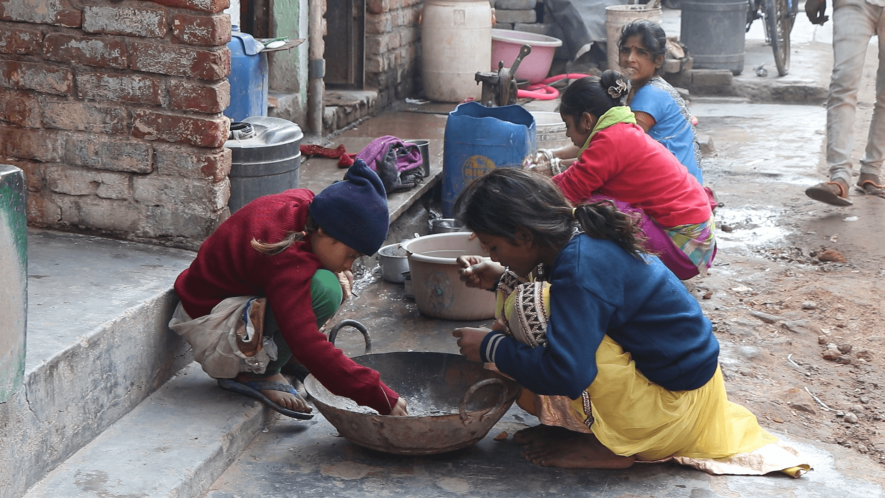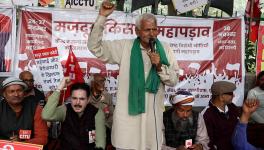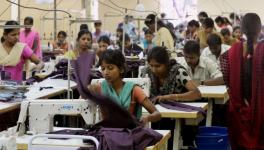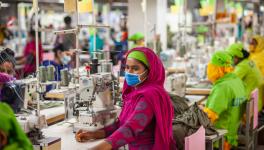#WorkersStrikeBack: Bawana Labourers Struggle for Minimum Wage, Safety, Threatened to Stay Away from Unions

Bawana Labourers Struggle for Minimum Wage
[As lakhs of workers gear up for a historic All India Strike on January 8-9, called for by ten central trade unions, NewsClick brings to you glimpses of the lives of industrial workers in different parts of the country.]
Sunita, a 40-year-old, a resident of Metro Vihar, is a labourer who was working with a metallic works factory in Bawana Industrial Area. She has been complaining that the skin of her hands has been peeling off after working with kerosene for 12 hours a day in the factory. As per the workers of the factory, the management blatantly ignored her pleas to help her with the treatment, and instead asked her to quit if she felt like.
“My hands are dipped in kerosene for 12 hours. I was told that I will be packaging toys, but as I started working, I learnt that the factory was illegally manufacturing crackers and fireworks,” recalls Sunita who left the job, fearing risk to her life.
Sunita alleges that the factory was licensed to make plastic, but the labourers were asked to make crackers inside. Sunita was earning Rs 5,500 per month after working for 12 hours a day. It’s not just her, workers in Bawana are paid between Rs 5000 and Rs 10,000, depending on their gender, age, and the hours they put in.
A 30-year-old labourer, Sarita, said, “Women workers are paid Rs 5000-6000, while men are paid Rs 7000-8000, when all of us do equal amount of work. Also, we are forced to work overtime. They threaten to throw us out if we are not willing to do 12-hour shifts. Besides, our salaries are cut if we take a day off. We can’t even demand for higher wages.” Many workers complained that the factory owners often call them to work on their off days, and never pay them on time.
In an interim order, on October 31, the Supreme Court directed that 37 per cent hike in minimum wages be restored, reversing a Delhi High Court order. Delhi government has also been directed to form a minimum wage advisory committee. According to the order, the wages of the workers from November 1 should be: Rs 14,000 for unskilled labourers, Rs 15,400 for semi-skilled labourers, and Rs 16,962 for skilled labourers. The hike was accepted by the unions, but to no avail, as the factories continue to pay meagre amounts to the workers.
Workers have been asked to be silent about their wages. “We are been asked to lie to the outsiders that we get Rs 14,000-16,000. We will lose our job otherwise,” said Bimla.
It’s always in the interest of the managements when the workers are not united, and their grievances go unheard. “Union people often come to us, and ask us about our problems, but the workers talk very hesitantly as they fear they might lose their jobs. We are threatened of dire consequences if we join unions,” said another worker, on the condition of anonymity.
Of late, workers have been lamenting about a trend where factory owners or thekedars prefer young girls over women aged above 35. Speaking to Newsclick, Rupa Singh, secretary, Janwadi Mahila Samiti (North Delhi), said, “Women above 35 are considered old, indolent and sluggish. Owners prefer women between 15 – 30, so that they can get more work done in less wages.”
Spread over 1,200 acres, Bawana Industrial Area has witnessed a spate of fire-related incidents and deaths. Mother of 30-year-old Sunila had died in one of the factory fires. According to Sunila, she never received any compensation. Instead, she had to search for a job to run her family and pay for the education of her 9-year old brother Krishna. “It had been four days since my mother had joined factory, when she died. All I know that the doors were locked. Villagers said that she tried opening the door, but it was locked.”
In Bawana, labourers have no concept of work safety and security. They are not provided ESI (Employee State Insurance) card which ensures their safety by providing medical care to the workers.
“Whenever we ask for ESI cards, they dodge our questions by saying that we will soon receive it, but it has been four years now, and I haven’t got any card,” said Vinay, a worker in his 30’s.
Bawana Industrial Area came into existence in 2004, when the Supreme Court (SC) ordered the Delhi government to shut down all the industrial and commercial units operating from residential areas.
Dr Prabhu Mohapatra says, “It’s [labourers’ routine] like some machine. Workers are made to work for more than 12 hours, and in the process, they get injured, or face death. A historian calls it “the sucked lemon” where the workers get thrown away as if they were a sucked lemon which is of no use,” he said.
In the context of the plight of the workers, a two-day general strike has been called by trade unions. Ten trade unions and independent federations have given call for a nationwide strike on January 8 and 9, 2019. Trade unions have warned that the continuous trampling of workers’ rights will be met with severe resistance.
Get the latest reports & analysis with people's perspective on Protests, movements & deep analytical videos, discussions of the current affairs in your Telegram app. Subscribe to NewsClick's Telegram channel & get Real-Time updates on stories, as they get published on our website.
























